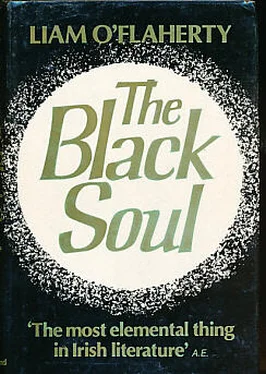The Stranger had forgotten about them when he paused at the stile leading from the end of the road to the shore. The hot sun stood high in the heavens. The tide was out and in front of him the broad-bladed seaweed growing on the outer stretch of the Jagged Reef glistened in the sun. With his foot on the stile he swelled out his chest and drew in a deep breath. Spring had put flesh on his bones. The hollows in his checks had filled. They were ruddy with health after the manner of people living in Inverara. His eyes were clear and far-seeing. His full-grown brown beard was glossy and smooth. The muscles of his thigh, as his foot rested on the stile, showed big through his clothes. He looked around him, breathing delightedly, revelling in his good health. Then he threw his arms over his head, uttered a low cry and jumped the stile on to the shore. He skipped along the crags out towards the sea. He didn’t stop until he reached the wet slippery seaweed on the Jagged Reef, and the sea swayed blue and mysterious at his feet. He looked down into it, his eyes wondering with a child’s wonder, sleepily, as men do when they are healthy and their minds sleep. Then suddenly, sleepily, he began to think. His eyes stood still. His body relaxed, and he let one foot go limp like a horse resting. He felt the sun beating on every muscle of his body through his clothes, warming and loosening the joints. His lungs were full of the invigorating smell of the sea, that itself was a mixture of many smells, seaweed, salt, and spices perhaps wafted by the breeze from distant lands where the sun always shone as in summer at Rooruck. He expanded his nostrils to drink in the scent and sat down on a high saddle of rock that was already dried by the sun. He thought that he had been transported into another world where sorrow was unknown, where the brain was a clear crystal reflecting the absolute beauty of nature, where the body was a perfect organism, impervious to disease, reacting only to joy, where the voice was only capable of song and laughter, where … And then just as suddenly his train of thought snapped like a cord that is pulled too taut. His happiness was shattered as his Black Soul began to smile scornfully at his thoughts. As soon as he tried to abandon himself to nature his cynical intellect jeered at him. He stared at the sea, listening to its languorous deep sounds that were so silent. ‘What a cursed thing is intellect!’ he groaned. He put his head between his hands and bit the little finger of his right hand. Intellect, not content with the present, must peer into the unfathomable future. Not content with enjoying the surface of nature or the beauty of a woman, it must look down into the depths beneath the fair surface, probing the depths with futile shafts of thought, discovering nothing, blinded by the chaos it causes and which it cannot control.
His brain became hot and wearied with these thoughts. Little binding red lights came before his closed eyes. His body twitched. It was degrading to be feeble and neurasthenic on that beach, in the presence of that cold fierce strength, that enthralling beauty! He clasped his hands together and said, ‘I must do something.’ Activity would banish thought.
He looked down into a round pool at his feet, that was half-filled with smooth stones and growing seaweed. He set himself to examine the forms of life that grew there, as if he were a natural-history student on an outing with his professor. Limpets clung to its sides, their serrated, pale grey shells like cones, their yellow flat faces dimly visible as the shells rose from the rock now and again. Scores of little fishes scurried hither and thither. They would stand for a moment, sniffing and wagging their tails. Then without apparent cause they would dart under a plant of seaweed with only their watching snouts visible. Soft blue fatty lumps grew on the sides of the pool near the bottom in little circular cups cut into the rock. Long threads waved from their mouths, trying to catch food. Then a crabfish tumbled along slowly from the far corner. It walked sideways and stopped now and again to roll its eyes around. The Stranger watched it half-asleep, so calm had he become watching nature. Then the crab disappeared under a stone and he began to think again.
How futile life was! Here was he, a man, with a brain capable of wonderful thought, and yet he knew nothing definite about anything. The fishes and those soft jellies and the crab clung to life just as eagerly. Men, crabs, limpets, jellies, were all the same. There was no sense or purpose in any form of life more than in another. All life was futile. Cities and books and armies and religions were of as little importance as one of those limpets that heaved wearily, trying to live. They were of as much importance as the tortuous and stupid march of the crab from one end of the pool to the other. They were searching for something just as the crab was. ‘What was he seeking, I wonder?’ he said aloud. Bending down, he raised the stone under which the crab had disappeared. The crab had found a mate. They lay in a ball. They never moved when he touched them with a sprig of seaweed. They were in a love-swoon, careless of their lives. ‘So that is love,’ he said.
Then he said ‘Je-sus Christ’ as he looked back at the world from that lonely shore at Rooruck. Two crabs lost in a love-swoon made him look at love from an altogether different angle. He had often argued during his university days, when he was very young and very sure of himself, that love was purely sensual. In Irish fashion he had argued with equal conviction at other times that it was purely spiritual, and at other times that it was a combination of both. Now he understood that his arguments had been nonsensical, ‘like all argument.’ He had talked like everybody else who discusses insolulable questions, just to hear himself talk, like a priest explaining a mystery. ‘Quite so,’ he said, ‘people are very fond of explaining anything they themselves cannot understand.’ He felt contemptuous of the civilized attitude towards love. ‘Conceit and hypocrisy! Deifying a natural form of life, crucifying men on its account, making laws to rob it of impurities, taking it out of the natural scheme of things and making it moral and immoral, giving it a purpose, as if nature had a purpose! What the devil is there behind the embrace of those crabs? And Little Mary? Was his love for her no different, or her love for him? Lascivious Summer answered, “No.” “Love,” said Summer seductively, “is but an expression of life, the desire to keep living, to make other things live with you, to protect you against, against, against …” ‘ And the thought faded away into emptiness as he remembered that he had heard it somewhere a very long time ago, and that it was ridiculous and meaningless. It died in a singing sound that wafted itself out of his brain, away over the sea. It ended in the back-wash of a wave that was flopping back into the sea from the edge of the Reef. He felt weak and helpless. ‘Damn women,’ he said, feeling it necessary to blame something tangible for his inability to reason things out to a conclusion.
He looked down again at the crabs. They were locked in an embrace. The sight did not repel him. They looked natural there. They were a part of nature. ‘But damn it, I am different,’ he said. ‘But how? Now tell me that, how am I different?’ His intellect hungered after the meaning of things. He wanted to find something tremendous and binding, whose meaning he would be afraid to question, something that he could accept blindly, like Catholics accepted the Pope. But he had nothing. Religion was too gross and puerile. Of love he had had formerly only sickly visions: and love was based on self-deceit and fear of reality. And of his life in Inverara there were only memories of his spring lust. Now summer made things look different. Little Mary appeared different. In summer one had time to examine critically. He pictured all her defects, the pimple on her neck, the repulsive softness of her lips as she lay in his arms, the stupid look in her eyes when he said something that she did not understand. And her husband Red John! Good God, she had lain with him. She had felt his tobacco-stained lips against hers. She must have done so since he was her husband. It was like loving a prostitute. Faugh! He blew out his breath and jumped to his feet.
Читать дальше












